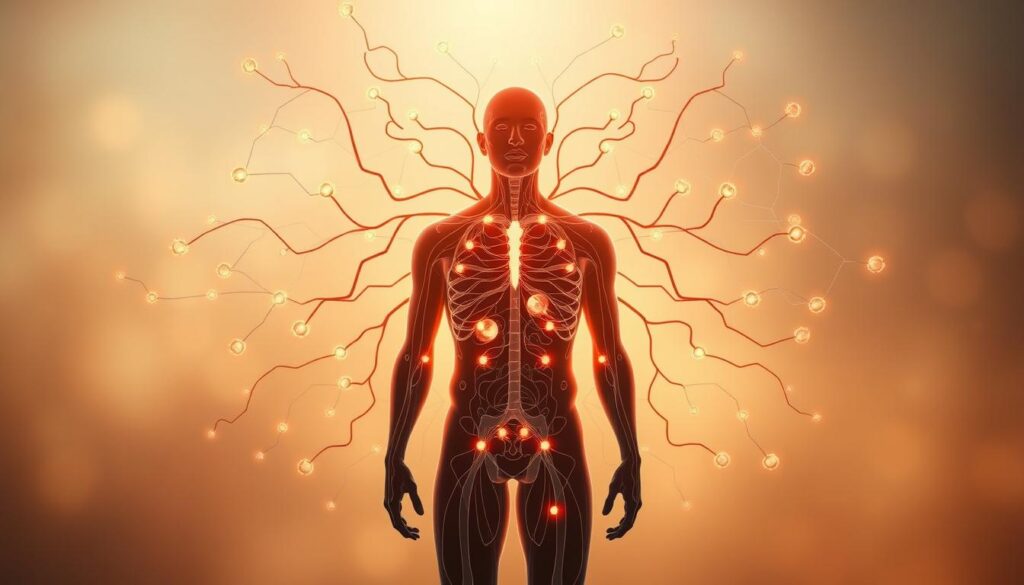Hormone balance is key for men over 40, as big changes can affect their health. After 40, hormone levels drop, leading to low energy and less sex drive. Our goal is to help men stay healthy with science-backed, holistic methods.
About 10% to 25% of older men have low testosterone, which hurts their quality of life. Knowing about hormone balance is vital for better health. With Dr. John Spencer Ellis, men can boost their looks, sex life, and energy. Sign up on DietGuru.com to begin.
We aim to help men improve their hormone health and overall well-being. We’ll discuss why hormone balance matters and offer tips for better health through science and holistic methods.
Key Takeaways
- Testosterone levels decline by about 1% every year after age 40, affecting hormone balance for men.
- Low testosterone levels can impact energy, libido, and overall quality of life, highlighting the importance of hormone health.
- Understanding hormone balance is key for tackling low testosterone and boosting wellness.
- Science-based, holistic methods can help men achieve optimal hormone balance and health.
- It’s important to talk to a healthcare professional before starting any supplements or hormone therapy.
- A personalized approach to andropause considers each man’s unique hormonal and health needs.
The Critical Role of Hormones in Men’s Health After 40
As we get older, our hormone levels change. This affects many parts of our health. Testosterone, a key hormone in men, helps with fertility, energy, and sex. Keeping hormone levels balanced is key for men’s health, and testosterone replacement therapy might help some men.
Studies show testosterone levels reach their peak around 30 years old. After that, they drop by about 1–2% each year. This drop can cause issues like low sex drive, tiredness, and less muscle. Low testosterone levels can also raise the risk of bone loss and affect brain function.
Some important facts about testosterone and men’s health are:
- Up to 50% of men over 80 are classified as hypogonadal.
- Testosterone levels decline by 1-2% per year after peaking at approximately 30 years of age.
- Low testosterone levels can lead to fatigue, depression, and reduced libido.
We’ll explore the main hormones and their roles, how they change with age, and signs of imbalance. Understanding hormones’ role in men’s health helps us keep hormone levels balanced. This supports overall men’s wellness.
Achieving Optimal Hormone Balance for Men
As we get older, keeping our hormone balance right is key for staying healthy and living longer. Studies show that changing our diet and exercising regularly can help. For instance, eating more healthy fats can boost testosterone by about 15%.
Also, exercising often can cut cortisol levels by 40%. This helps balance hormones and boosts health.
Here are some tips for better hormone balance:
- Make sure to get enough sleep to avoid high glucose and insulin resistance
- Do regular physical activities like walking or cycling to raise testosterone and boost mood and energy
- Eat a diet full of omega-3 fatty acids, like fatty fish, to help with mood
Learn more about testosterone and mental health in men over 40 at this link. By following these tips and making smart lifestyle choices, men can better their hormone balance. This can increase energy and improve overall well-being, supporting longevity and health.
| Lifestyle Modification | Effect on Hormone Balance |
|---|---|
| Regular Exercise | Increases testosterone levels, improves mood and energy |
| Healthy Diet | Supports mood regulation, increases testosterone levels |
| Adequate Sleep | Regulates insulin response, supports hormone balance |
Natural Methods to Support Hormonal Health
We think natural ways are key to keeping hormone health and men’s wellness in check. Simple daily changes can help men manage their hormones and boost their health. For instance, eating 25–30 grams of protein at each meal can balance hormones. Also, a diet full of soluble fiber can make insulin work better.
Regular exercise is vital for hormone health. Studies show that working out can lower insulin levels and make insulin work better. Good exercises include high-intensity interval training, strength training, and cardio. Stress management through meditation and yoga can also lower cortisol and balance hormones. As dietguru.com points out, a healthy lifestyle is key for keeping hormone levels right.
- Eat a balanced diet rich in whole foods, fruits, and vegetables
- Stay hydrated by drinking plenty of water
- Get enough sleep each night to help regulate hormones
- Manage stress through relaxation techniques such as meditation or deep breathing
| Dietary Modification | Benefit |
|---|---|
| Eating 25-30 grams of protein per meal | Helps balance hormones |
| High soluble fiber diet | Increases insulin sensitivity |
Medical Approaches to Hormone Optimization
As we age, our bodies change in ways that can affect our hormone balance. This includes a drop in testosterone levels. Symptoms like low energy, decreased libido, mood swings, and less muscle mass can occur. Luckily, there are medical ways to improve hormone balance and alleviate these symptoms.
Hormone replacement therapy (HRT) is a common approach. It involves using synthetic or natural hormones to replace what’s missing. Testosterone replacement therapy (TRT) is a type of HRT for low testosterone. Research has shown it can boost mood, sexual function, and muscle mass in men with low testosterone.
Nutritional counseling and supplements are also used to improve hormone balance. For instance, magnesium and vitamin D supplements can raise testosterone levels in men. Regular massage therapy can also help by lowering cortisol levels, which can help testosterone production.

In summary, medical methods can help with low testosterone and restore balance. Men can work with healthcare providers to find the best treatment for them.
Lifestyle Changes for Enhanced Testosterone Production
As we get older, our testosterone levels go down. But, making some lifestyle changes can help keep hormone levels balanced. Testosterone is key for men’s health, and when it drops, it can cause low energy, less sex drive, and higher disease risk.
Studies show that sleep, the environment, and supplements can really affect testosterone. For instance, sleeping just 5 hours a night can cut testosterone by 10%–15%. But, sleeping up to 9.9 hours a night can boost testosterone in older men.
Also, taking supplements like vitamin D, zinc, and quercetin can help make more testosterone. Here’s how much to take each day:
- Zinc: 25-50 mcg
- Quercetin: 400 mcg
- Vitamin D: as recommended by a healthcare professional
By making these lifestyle changes, men can help their hormone balance and overall health. This is important for staying healthy and feeling confident.
Sexual Health and Hormonal Wellness
We know how vital sexual health is, tied closely to hormone balance. As men get older, their hormone levels, like testosterone, drop. This drop can cause problems like erectile dysfunction and lower sex drive.
Staying active and eating right can help keep hormone levels up. For instance, lifting weights can raise testosterone by up to 20% in older men. Eating well can also boost testosterone by 10-15%.
Several things can affect sexual health and hormone balance. Here are some key ones:
- Testosterone levels: Men make 4 to 7 milligrams of testosterone daily, key for sex health.
- Age: Testosterone peaks in men in their 20s and drops about 1% each year after.
- Diet: Eating a balanced diet with nutrient-rich foods helps hormone production.
- Physical activity: Regular exercise, like strength training, boosts testosterone and supports hormone health.
Understanding the importance of sexual health and hormone balance helps men stay healthy. They can make lifestyle changes like exercising regularly and eating well. They should also know how age and other factors affect hormone levels.

Men should focus on their sexual health and hormone balance. It greatly affects their life quality and how long they live. By supporting hormone health, men can keep their sex life and overall health in top shape.
| Factor | Impact on Hormone Health |
|---|---|
| Testosterone levels | Essential for sexual health, declines with age |
| Diet | Supports hormone production and regulation |
| Physical activity | Boosts testosterone levels, supports overall hormone health |
Conclusion: Taking Control of Your Hormonal Health Journey
Getting your hormones in balance is key for men’s health, and you can start anytime. Learn about important hormones, make lifestyle changes, and get medical help when needed. This will help you on a journey to better hormone balance and wellness.
Changing your diet, doing specific exercises, or managing stress can boost your hormone health. Taking action can give you more energy, better sex life, and a strong body. It helps you deal with aging’s changes.
Your journey to better hormones is personal, and working with doctors like Dr. John Spencer Ellis is vital. By starting with DietGuru.com, you get resources and support for your path.










